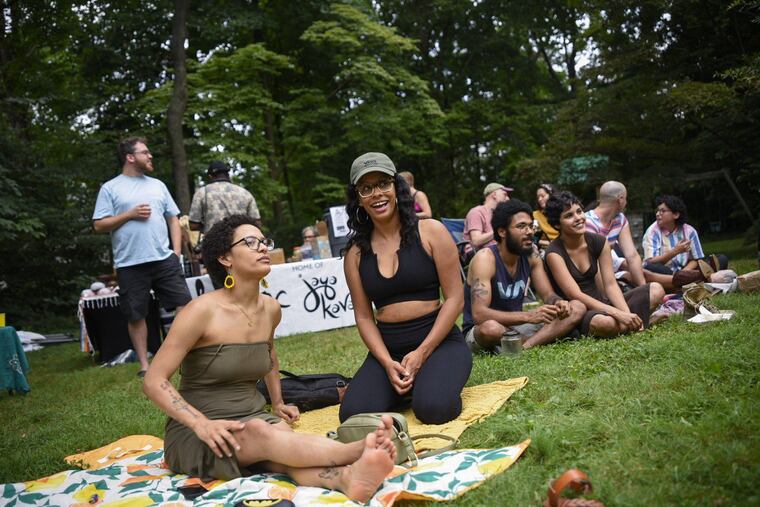Sweet Juice is not like other music festivals. They like it that way
The queer-led music festival takes place this Saturday at Rigby Mansion in Germantown.

Over the two days of last year’s Made in America music festival, more than 80,000 people crammed together on the Ben Franklin Parkway to see international superstars Burna Boy and Bad Bunny; millions of dollars went into Philly’s biggest festival, as well as the Philadelphia economy, as a result.
The first Sweet Juice Fest in Germantown last summer, on the other hand, was much more modest. The musical acts were all local, upcoming performers. Attendance was intimate and limited, and the stage was a porch. But the Sweet Juice organizers like it that way.
“We really want to bring the community and the engagement back into the music and art scene,” said Mel Harris, cofounder and finance director of Sweet Juice.
Sweet Juice is a queer-led artist collective that focuses on community engagement and involvement; this is their flagship event. The second annual Sweet Juice Fest will be Saturday, July 22, at Rigby Mansion, 523 Church Lane, from 1:30 to 9 p.m. Tickets are available on sliding scale with a $35 suggested price, but no attendee will be turned away for lack of funds while tickets last.
This year’s festival will feature music performances from artists like Shamir, American Trappist, Brittany Ann Tranbaugh, Samantha Rise, and the youth music program Rock to the Future. Visual art is a major piece of Sweet Juice, too; there will be an interactive art installation, art vendors, and a “chill” area to take a break from the music where festivalgoers can paint or draw. The festival will also host food vendors and a drag performance by Eugene Riderher Betta.
“We want to make sure that everyone in Philly has the ability to participate in music and art and have a creative outlet,” Harris said.
Music as a community practice
It was important to the Sweet Juice organizers that their offerings go beyond the arts and other traditional festival add-ons. They want to build a community for people who love to perform and experience music and art, particularly for BIPOC, queer, and gender-expansive people.
On Sweet Juice’s website, the group explains, “[we] hope that our events inspire casual music-goers to get more deeply involved in their neighborhoods and strengthen the network of artists, individuals, and organizations working to address inequities here in Philadelphia.”
“Anytime queer art is made, it’s radical because it goes against the societal norm.”
They work to highlight community organizations at their events, and include cooperative elements like clothing and record swaps. Sweet Juice leaders said that much of their communal focus comes from the fact that they are all queer.
“There is a cultural, political aspect of queerness that has to do with collectivity, that has to do with sharing resources, that has to do with collective responsibility … dating back to the Black trans femmes that have led the LGBTQIA [plus] movements since long before our time,” Harris explained.
Samantha Rise had to miss last year’s Sweet Juice Fest, and “bummed” wouldn’t quite describe their feelings. “It was a major point of devastation for me,” they said, admitting to have “fanboyed” the collective and its festival since last year. But now that Rise is part of the lineup this time around, they are thrilled to join in.
“Music, it’s a community practice. It’s meant to be shared, it’s meant to be performed and created and appreciated collaboratively.”
“I was so eager and excited to say yes. I would have volunteered or shown up in some other way … but it feels really special to be a performer,” they said.
Rise is a West Philly-based singer-songwriter, and describes their music as a blend of Americana, Philly R&B, and a “cosmic country vibe.” But activism and community building is just as important to their body of work — they have worked with groups like ACT UP Philadelphia and led programming for a girls and trans youth music group in the past.
“Music, it’s a community practice. It’s meant to be shared, it’s meant to be performed and created and appreciated collaboratively and so are all the spaces where we make it,” they said.
“I can’t think of a better space or venue than Sweet Juice.”
When the friends behind Sweet Juice were originally brainstorming what their collective and festival would be called, they wanted to put their identity out front.
“We were gonna be Lethal Lesbians,” said Katie Hackett, cofounder and music director of Sweet Juice. Unfortunately, the name was already taken by an Israeli film festival. They settled on Sweet Juice because they envisioned a sultry, juicy vibe to their events, where they squeezed more juice out of the sometimes untapped power artists hold. But even with the name change, they wanted to maintain a radical spirit.
“Anytime queer art is made, it’s radical because it goes against the societal norm,” Hackett said. “It feels really good to work with people who are in a similar mindset and have similar goals and that [can] all relate to each other.”
While Sweet Juice is excited to continue building on the success of last year’s festival, organizers are careful about maintaining those commitments to countering what a traditional music festival looks like. Growth often comes with a cost to ideals.
“What’s really important to us … is making sure that when folks enter our space, they feel taken care of,” Harris said. “It’s really hard when you start growing bigger to not quickly veer into these very money-forward, capitalist-centered events.”
As they look forward to the future, they’re thinking about how to grow while still remaining accessible and still uplifting their underrepresented communities. Plus, goats.
“We always are just popping with ideas. For awhile, I was like, we have to bring goats to the festival so kids can pet the goats,” Hackett said.
“Eventually we would love [that]. I would love to have goats. I love goats.”